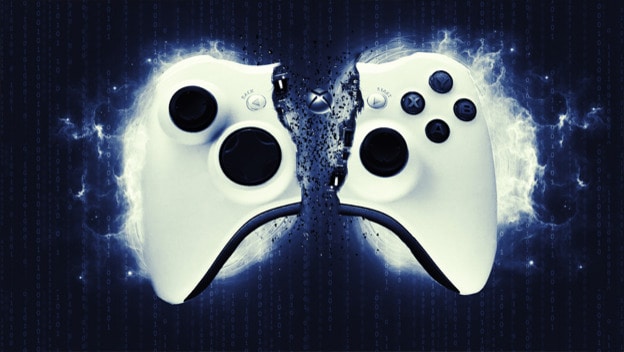I admit to not being exactly “up there” in terms of knowing the latest and greatest of what the gaming industry has to offer, despite my position here at Cheat Code Central as a News Writer. In all honesty, I have a very small pool of games that I’ve genuinely experienced in my life, most of which are exceptionally old by modern standards. Having said that though, I like to think that that gives me a different perspective when appraising games that are coming out today (or games that have been out for a few years already), especially with what next-gen (now current-gen) games may potentially offer in the future.
Like difficulty.
Now, when I say “difficulty” I don’t strictly mean “how hard a game is in terms of mathematical adjustments and tweaks”. I’m pretty much referring to a broader sense of the term that includes checkpoints, health regeneration, chest-high walls, waypoints, etc. I like difficult games, to be honest. I like games that are hard to play; games that genuinely challenge you; games that require you to actually think and figure things out for yourself–like looking at your in-game map to know where you’re going next; like scrounging for anything that’ll give you any health or armor; or like trying not to flat-out die.
There are some games out there that have their slice of cake and eat it too when it comes to dealing with these attributes and difficulty. The original Bioshock gives you the option to make it easier on yourself by either switching on or off certain attributes–like the waypoint arrow–despite what difficulty you play it on, but on bad days you still have to scrounge around for anything and everything that’ll give you health or EVE, or give you money to get health or EVE anyway. On the flipside though, there are more recent games out there that also make things harder (even if it is only slightly) on yourself no matter what difficulty you play it on. Dead Space 3 , which has you micro-manage your ammo, because reloading too early will waste the remaining ammo in that magazine you’re expending, as well as the stress of scrounging for health and ammo as you progress through the game on higher difficulties on top of that. As go-to examples, think Demon’s/Dark Souls or Volgarr the Viking .
Back in the day, in the before times (in my personal experience), games were more difficult (albeit slightly) than what they are today. I say that because back then I didn’t have the comfort of checkpoints, health regeneration, chest-high walls, waypoints, etc. as a default safety net for whenever I fluffed up, and upon revisiting these games now I can say that I had more fun and, more importantly, had more of a challenge when trying to beat these games on their highest difficulties. The game where I had this bit of an epiphany was when I started playing an old childhood favorite on the Nintendo 64: GoldenEye 007 .
Of all the games I spent playing the most on my N64, aside from Super Smash Bros. , it was GoldenEye 007 (which I liked to joke about–and still do, though rarely–with my brother as being the greatest shooter in the history of ever, and no, you can’t tell me otherwise) that I spent a good chunk of hours on, though it was actually my brother that completed it fully.
In GoldenEye there is difficulty, yes, but “difficulty” in a different sense compared to what I’ve seen and heard from today’s shooters in general. There are no health regeneration systems, nor chest-high walls; no waypoints, nor checkpoints. You had one life to get the mission done, and if you didn’t, you had to start all over again–right at the very start of the mission, which is an absolute nightmare on the higher difficulty settings (but in a fun/challenging way)! Most people may consider that incredibly frustrating, and after more than several attempts, yes, I would agree with them; but those gaming conditions are what I thrive on as a guilty pleasure–probably because I can be so determined it’s unhealthy sometimes.
I enjoyed playing GoldenEye on the higher difficulties, despite how many times I’d die, because it presented more fun and more of a challenge to me; how I had to carefully time and engage which corner I should clear of enemies first, decide which weapons would be good at what point in each level, and think, “Can I get a headshot from this distance? Oh, God, where’s that damnable armor?!” Hell, I even had to restart most missions if I lost too much health at the beginning, because I knew my chances of survival were significantly decreased–and that was on a good day.
It’s attributes like these–where you’re required to actively think about how to successfully win an engagement, using common sense to overcome an obstacle simply by reading the information presented to you without being outright told what to do, figuring out puzzles and navigating maps, or surviving without the comfort of a safety net–that I feel should be more of a standard discipline in today’s gaming industry. Not only would it be more challenging, but it’d be healthier for your brain too, as it too would be challenged to solve problems quicker and more accurately (of course that experience will mostly differ from person to person).
GoldenEye opened my eyes to how much difficulty in games has changed over the years. Nowadays, from my experience and from what I’ve heard, you typically get your hand held for, let’s say, the first 10 minutes of a game. You are sometimes even stopped dead, just so you can read a tutorial pop-up, or to perform an action that simply must be initiated then and there for the sake of making sure that you know exactly how to use it, by rooting your body to the spot. In amongst all that, you either have health packs or health regeneration, chest-high walls or various upgrades and apparels to keep you alive, as well as waypoints to keep you on track, or scripted cutscenes for you to do X for Y things to happen, etc.
Whilst some of those things are good from a storyline and immersion perspective–as long as they’re contextualized by the narrative–some things are just woefully unrealistic, like regenerating your health back to full after having a smooch on the cheek by an RPG to the face or inexplicably indestructible chest-high obstacles. All these variables, and probably more, have made games easier and more accessible for people to play, in my opinion. That doesn’t mean to say they’re bad games though, I just sometimes have a particular itch that needs scratching.

However, I do believe the game industry should come back to disciplines of removing such game design comforts in the future, so that future games are more of an intellectual as well as a fun challenge, encouraging–no, forcing–players to be better at games by robbing them of safety nets. I believe that losing can be fun, because it’s a learning experience and, therefore, an opportunity to become better. Frustrating, yes, but still fun. I would rather play a game that begins hard then progressively gets even harder, and lose a bunch of times from my own faults, than play a game that’s super easy to start with and incredibly hard at the end, and die to unnecessarily tilted odds–though I would accept the challenge nonetheless.
As well as beating into being a better gamer, difficulty in games can have a massive effect on play styles and story immersion, in my opinion. For example, let’s look at Dead Space 2 ’s Hard Core mode, which is the hardest difficulty in the game and you only get three saves .
In Hard Core mode you start completely anew with unfair odds, and you aren’t allowed to bring over your upgraded-to-all-hell arsenal from your previous play-throughs. This is what I’d like to see done in future games, because it just outright beats you into a pulp time and time again, but each time you come back progressively better. From a story standpoint, it makes the gnarly Necromorphs a different kind of beast altogether, and adds a new spin of caution and fear about them, like you would feel if it were a real-life situation. This, in turn, (from a playstyle standpoint) affects how you play the game from then on out, because you can’t engage the enemy or they’ll maul you to bits, but they happen to be in your way, so you have to come with a creative solution by using as little resources as possible. That’s what I want to see as a discipline in future games, not as an unlockable optional. Sure, you can do that with Dead Space 2 ’s lower difficulties, but you have the comfort of knowing you have your checkpoint safety net. In Hard Core mode you have hardly any safety nets, which I believe produces a better gamer in general, even if it is after many trial and errors.
So, to round up, I believe the harder a game is the better the gamer will be by the end of it, even if it means starting all over again from scratch after failing each mission. In order to be better at the game, the game itself has to punish you until you get it right and stay alive without the comfort of knowing there’s a checkpoint/chest-high wall nearby or having your health regenerate. In addition, harder difficulty can assist in a game’s narrative and put gamers into situations where they have to think about the best possible outcome using the least possible resources. Then, if they fail, they try again. This is why I prefer harder difficulties in videogames, and I believe the games industry should at least attempt to implement these disciplines in future games.
